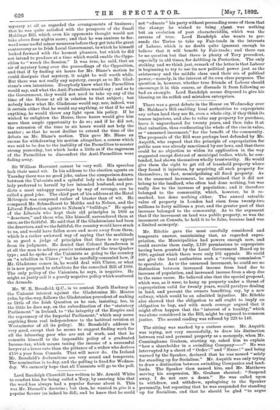There was a great debate in the House on Wednesday
over Mr. Haldane's Bill enabling local authorities to expropriate any urban land they see fit, even a whole city, if they think its. tenure injurious, and also to value any property for purchase, leave it nnpurchased for twenty years, and then take it at that valuation, thus confiscating the whole of the rise in value, or "unearned increment," for the benefit of the community. The proposals of the Bill were perhaps best defended by Mr. Asquith, who argued that the principle of expropriation for public uses was already sanctioned by our laws, and that there could be no objection to widen its application in the way suggested except distrust of municipal bodies, which, he con- tended, had shown themselves wholly trustworthy. He would give them the right to get rid of leasehold property where they found it injurious, by acquiring all such property for themselves ; in fact, municipalising all fixed property. As to the unearned increment, he maintained that it did not belong to the landlord, who often had done nothing, but was really due to the increase of population; and it therefore belonged to the community, which, however, be it. re- marked, has done nothing either. The annual rateable value of property in London had risen from twenty-two millions to forty millions a year, and the greater part of that increase belonged to the community. As to the argument that if the increment on land was public property, so was the increment on Consols, he held it to be false, because land was. a limited monopoly.






































 Previous page
Previous page